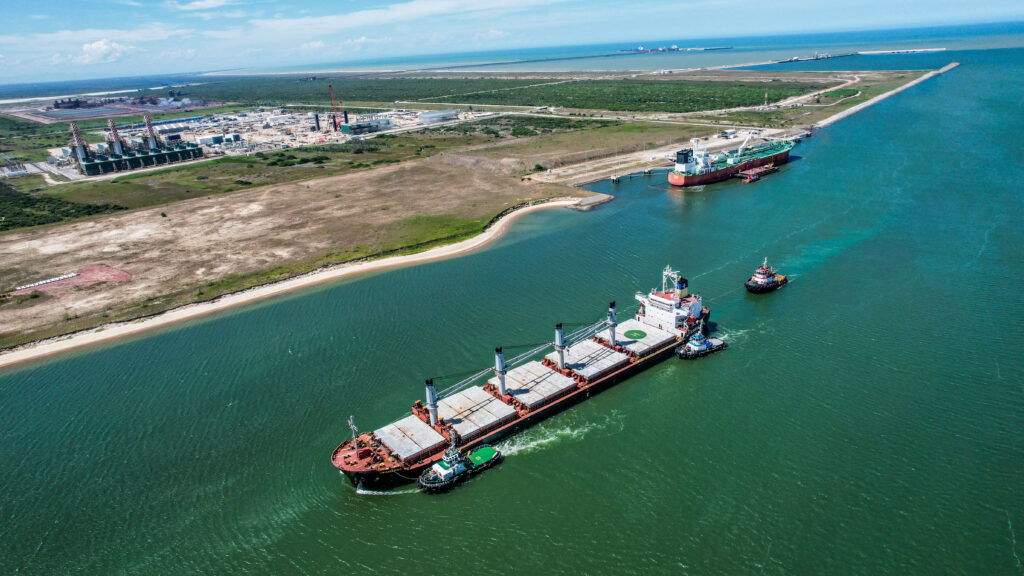With the aim of accelerating port and maritime decarbonization in Brazil, the UN Global Compact – Brazil Network is launching the first version of a guide for the sector, developed by the Ocean Business Working Group, linked to the Water and Ocean Action Platform, and is the first corporate hub in the country created to drive the energy transition of ports and maritime transport. The launch, which is available online, offers a comprehensive overview of the global discussions around decarbonization in the port and maritime sector; it highlights the main challenges of this agenda and explores the opportunities, especially for Brazil, which has the potential and resources to position itself strategically in this scenario.
The guide was presented at SDGs in Brazil 2024, the largest Brazilian corporate sustainability event in the world, on September 20, in the Delegates Dining Room, inside the UN headquarters in New York, by Fernanda Sossai, head of Port Development at Port of Açu, the GT’s lead company.
The maritime transport sector plays a key role in global trade and is a significant source of greenhouse gas (GHG) emissions, accounting for approximately 3% of global emissions, according to the International Maritime Organization (IMO). The IMO has set targets for reducing these emissions, with objectives of reducing them by 30% by 2030, 80% by 2040 and reaching net zero emissions by 2050. If no mitigation measures are adopted, emissions associated with maritime transport could increase by between 50% and 250% by 2050. In Brazil, with a coastline of 7,367 km, the so-called sea economy accounts for around 19% to 21% of the national GDP (FGV, 2018). In addition, approximately 95% of Brazilian exports are made by sea, according to data from the National Bank for Economic and Social Development (BNDES).
“The transition to a zero-emissions economy in the maritime and ports sector is not only an urgent environmental need, but also an opportunity to ensure a fair and inclusive transformation. Although there are still many paths to be defined, with various fuel alternatives being studied globally, we must be proactive, building solutions that are not only efficient, but also equitable, i.e. distributed fairly, with special attention to the needs of different groups,” said Carlo Pereira, CEO of the UN Global Compact – Brazil Network, who highlights: “The future of maritime transport in Brazil will be shaped by the decisions made today.”
The Guide is the result of more than a year’s dedication by the Ocean Business Working Group, which was born in July 2023, with 60 participating companies and is part of the Ocean Stewardship Coalition agenda, led by the Global Compact’s ocean team, based in Norway, and will be managed by Rede Brasil. In 81 pages, the material lists the main challenges and opportunities for the sector, such as decarbonization ecosystems for ports and alternative fuels. “Brazil has explored various technological routes in search of alternative fuels for maritime transport, such as biodiesel and HVO, green diesel, ethanol and methanol. The choice of the best alternative will depend on the most variable factors, such as costs, energy density, available technologies, dangerousness, availability of infrastructure for supply, application for the different types of vessels and routes, among others,” explained Rubens Filho, executive manager for the environment at the Brazilian Global Compact network. “And each fuel must be analyzed in terms of its advantages and disadvantages in terms of performance and environmental impact, according to its use.”
“The port sector has an unprecedented opportunity to be the lever for improving the efficiency and sustainability of industries in response to the challenges posed by climate change. Investing in sustainable technologies and practices, in the resilience of operations and in the adoption of renewable energy solutions will position ports as competitive means for the energy transition and climate adaptation. By establishing ourselves as energy hubs, we, as a port-industry, have a fundamental role to play in the transition from the maritime sector to industrial sectors that are difficult to reduce,” said Eugenio Figueiredo, CEO of the Port of Açu.
The Guide also includes national and international cases, a set of recommendations and an analysis of decarbonization on the government’s agenda. The UN Global Compact – Brazil Network wants to expand the WG to build joint solutions and exchange experiences between the players involved in the maritime and port industry. The aim is to provide a space for pilot projects and innovations to take place.



